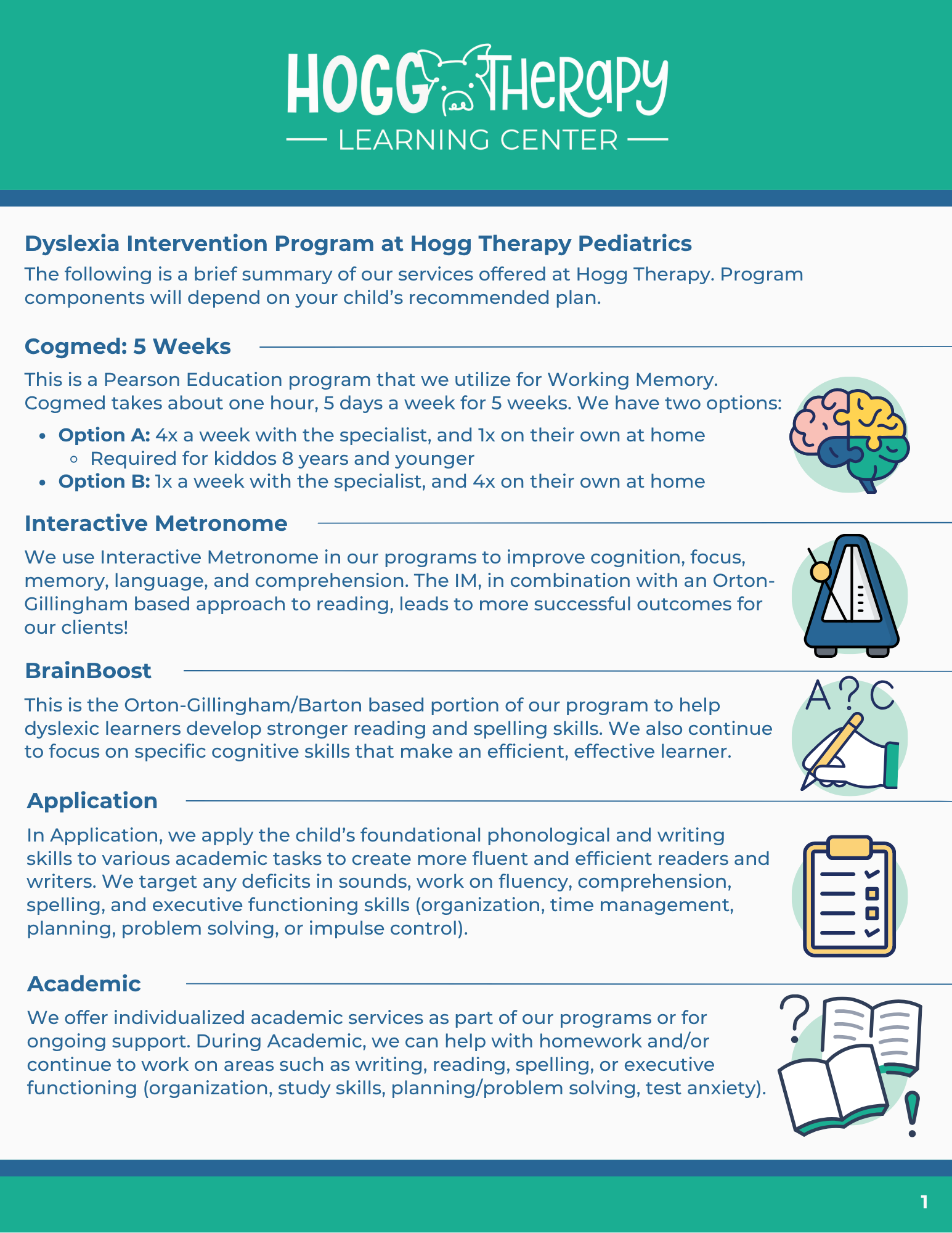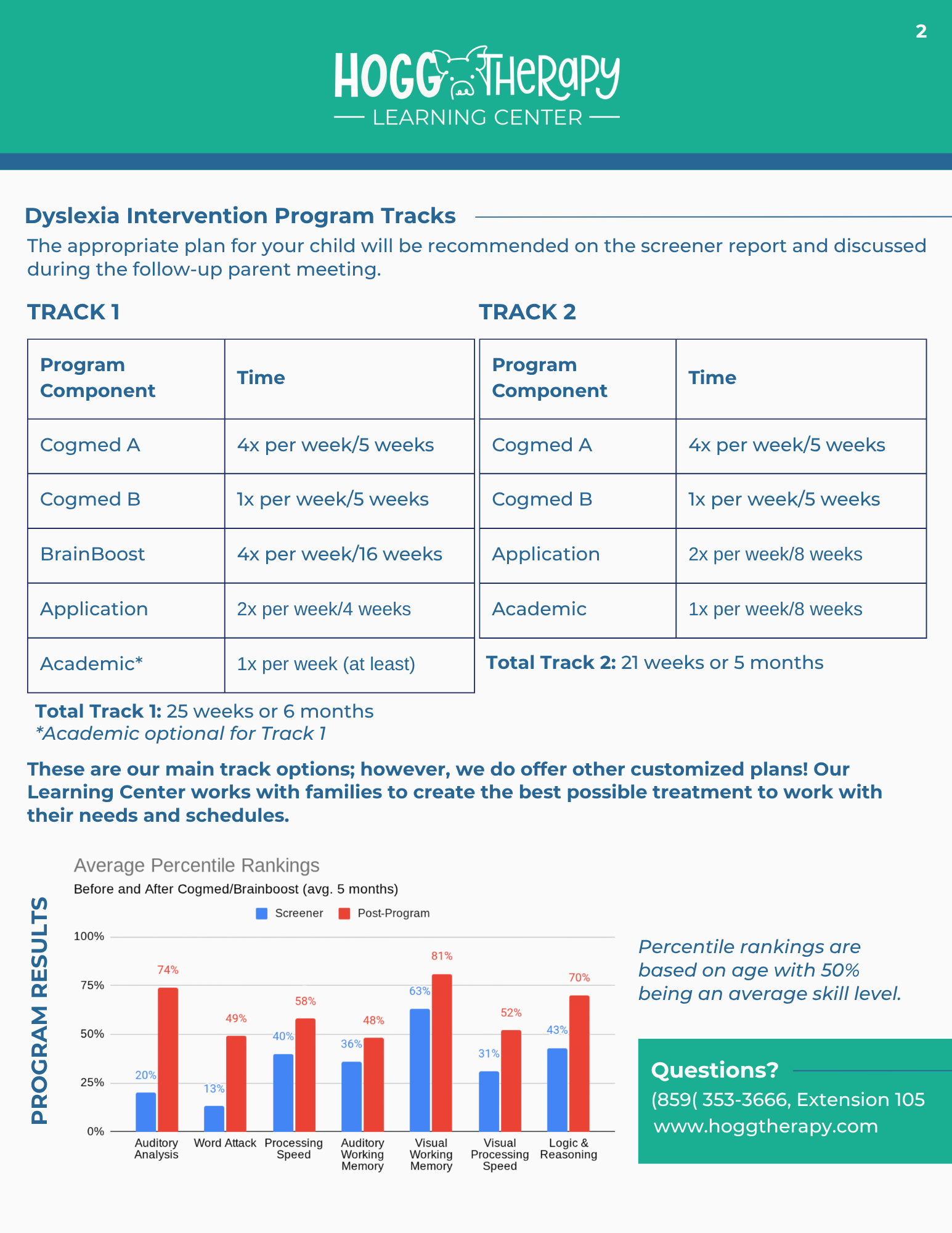Dyslexia Intervention
At Hogg Therapy’s Learning Center, our team of Learning Specialists is dedicated to identifying and supporting children with Dyslexia. Using evidence-based assessment tools and interventions, we provide comprehensive Dyslexia evaluations and individualized treatment plans designed to meet each child’s unique needs. Services are available both in-person and virtually, allowing us to support families no matter where they are.
-
What is Dyslexia?
Dyslexia is a common learning difference that affects how children process written and spoken language. Knowing and identifying the signs early can make a tremendous difference in getting the support they need. Here are some of the most common signs of dyslexia that we see in children:
- Difficulty with reading: Children with dyslexia often struggle with decoding words—breaking words down by sound and blending them together. They may read more slowly than their peers or have difficulty comprehending and retaining what they’ve read.
- Challenges with spelling and transposing letters and numbers: Frequent spelling errors, especially those that don’t follow typical developmental patterns, may be another sign of dyslexia. A child may spell words phonetically, but their attempts are often inconsistent. Children with dyslexia may also tend to write in all capital letters or consistently confuse letters like b/d, p/q, and m/w.
- Difficulty following directions: Children with dyslexia may have a hard time following multi-step directions, even when they understand the instructions at first.
- Poor rhyming skills: It can be challenging for children with dyslexia to recognize or produce rhyming words or to break words down into syllables.
- Lesser-known signs of dyslexia: Some children with dyslexia may have difficulty with directionality, such as telling left from right or distinguishing up from down. Trouble learning to tie shoes can also be an early indicator of dyslexia.
Early intervention is key for children who have dyslexia. Support from educators and specialists who can provide the right tools for success is integral to helping these children thrive in their learning journey. If you think your child may have dyslexia, we’d love to be a part of their path to success!
-
Step 1: Learning Evaluation
We take pride in offering the most comprehensive assessment available in order to be intentional about our strategies for improvement. We provide you, as the parent, teacher, or administrator, data about the true cause of your student's educational gaps. Then, we are able to customize a plan of action based on informed, calculated data. Our full treatment plan has 3 phases that have a defined regimen and measurable outcomes.
-
Step 2: Treatment & Academic Intervention
1) Cognitive Intervention/Brain Boost
The key to our success is to first address the underlying cognitive deficits to bolster neurological abilities for reading, writing, and listening which then translates to speech and speaking. Through fast-paced, fun activities, cognitive skills are developed in auditory and visual processing, working memory, processing speed, word attack, and logic and reasoning. We are laying the foundation for success with reading, thinking, and writing. This short, intensive intervention changes lives!
Duration: Minimum of 90 single-hour sessions divided into 4 sessions per week. Can be completed online.
2) Application
Now that the foundation has been laid, we are going to build the house! The next step after completing Brain Boost, is improving reading and listening comprehension, memory, oral vocabulary, critical thinking, and writing. Reading fluency and phonemic awareness are also targeted in this phase.
Duration: Minimum of 8 one hour sessions divided into 2 sessions per week. Can be completed online.
3) Academic
We are ready to put the roof on our new home! Now that our cognitive deficits are bolstered and neurological pathway connections are established, it's time to sail academically! During phase 3, your student will learn strategies to ensure academic success. Struggling in a specific area? We provide reading, writing and math intervention as well as critical thinking, organization, and test-taking strategies. Our academic intervention is tailored to the needs of each student and their learning preferences.
Duration: Single hour sessions divided into 1 session per week. Number of weeks is individualized per student. Can be completed online.
-
Our Tools
We use a range of evidence-based tools to assess and support students with Dyslexia and related learning challenges. Our comprehensive evaluations look at phonological processing, reading fluency, comprehension, spelling, and more—allowing us to create a personalized plan that targets each learner’s specific areas of need.
We are proud to be one of the few providers in the state of Kentucky to offer Cogmed, a research-backed program designed to improve working memory and attention. Working memory is key to the brain's processing capacity. It is vital for concentration, reasoning, learning, and resisting distractions. Cogmed is the single most scientifically validated method for improving working memory and attention, making it a powerful complement to our reading and academic interventions.
Our goal is to equip each child with the tools they need to thrive academically and confidently—and to do so in a way that is both structured and encouraging.
Fast ForWord
Fast ForWord is an evidence-based, adaptive reading and language program that delivers 1-2 years gain in 40-60 hours of use for any struggling learner. Their unique brain-based approach targets the root causes of reading difficulty to deliver lasting results that make better readers and lifelong learners.
Interactive Metronome
Interactive Metronome® (IM) is an evidence-based training and assessment tool. IM is proven to improve cognition, attention, focus, memory, speech/language, executive functioning, and comprehension, as well as motor and sensory skills. Doing IM along with a targeted reading intervention results in greater retention and progress. It can also be used to improve focus and sustained attention in students with ADHD.









































































































